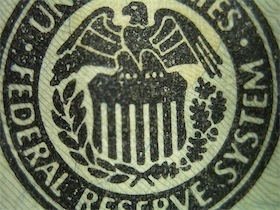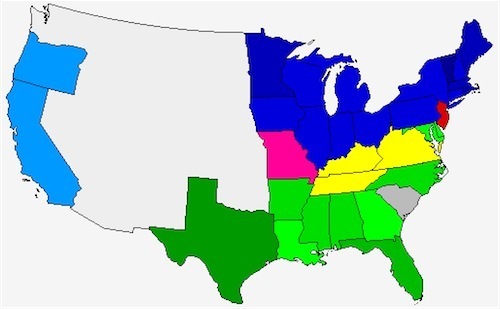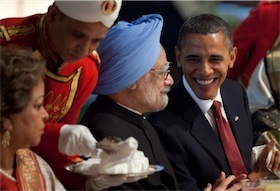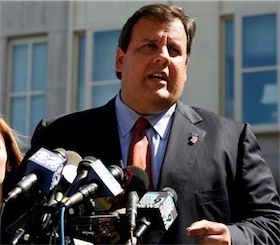Matthew Yglesias's Blog, page 2503
November 10, 2010
Two on QE2

(cc photo by LateNightTaskForce)
Let me recommend recent posts from Tyler Cowen and from Karl Smith responding to critics of the new round of quantitative easing.
On a less technical level, I note that a lot of the discussion aimed at popular audiences (e.g., Sarah Palin), professes to be shocked by the idea of just "printing money." This is really a kind of confused criticism. Money is a useful thing. And the way or system has worked for decades is that money is produced by the government. So the government is always printing money. You just may not have been paying attention. And if the quantity of money were going down rather than up, that would also be a policy decision. This is how it worked when Ronald Reagan was President, it's how it worked when Bill Clinton was President, and it's how it works today. There's nothing weird about it other than the general fact that the practical operation of a modern capitalist economy is at odds with a certain number of fairy tales about free markets.
Consequently, the Fed can't really "do nothing." It's constantly, necessarily, adopting a policy stance.


Five Years of BHTV
A brilliant distillation of the past five years worth of news from BloggingHeads TV:
Among other things, a sobering reminder that I used to be considerably less bald.


Election of 1860 Counterfactuals
Seth Masket is doing some mythbusting with reference to the electoral college:
Lincoln only won in 1860 because the Democratic Party was fragmented. Actually, Lincoln won 180 electoral votes — almost 60% of the Electoral College. Even if all three strains of the Democratic Party had somehow unified behind one candidate, Lincoln still would have won. There were just far more voters in the free states.
Indeed, the fragmentation of the opposition had almost no impact on the outcome. Lincoln won two states—California and Oregon—by mere plurality. But those two contained only seven electoral votes at the time. He won fully 173 electoral votes by majority, more than enough to win.
The key thing, though, is that in the Unified Democrats counterfactual Lincoln is elected President even though sixty percent of the country voted for his opponent. We're lucky that sort of extreme outcome is rare in practice, though of course a version of it arose in 2000 and we've been paying the price for the past ten years. In the specific case of Lincoln, we can deem his democratic legitimacy intact on the theory that the country's African-American inhabitants would have voted Republican had they been allowed to. But the fact of the matter is that the underlying method of picking a president is ridiculous and really ought to be done away with.


Liberalism
Jon Chait had a good post this morning about how there's no contradiction between Barack Obama praising the liberalization of the Indian economy and also being a liberal in the US political context. Indeed, one hint might be that the letter-string "l-i-b-e-r-a-l" occurs in both terms.
There's a commonly held view that modern day American liberals aren't "really" liberals and that the "real" heirs of the classical liberal tradition of Hume, Smith, and Mill are conservatives or libertarians. I think that's honestly nonsense. There's just nothing in the liberal tradition to suggest that there's anything wrong with the welfare state, social insurance, redistributive taxation, or environmental regulation. There's plenty in the liberal tradition to suggest that peace and social tolerance are important. And there's no systematic difference between the left and right in America about things like taxi medallions or yacht broker licensing. All major political figures in the contemporary United States are pretty liberal in the scheme of things, but I'd say that mainstream liberals like Barack Obama are, indeed, the most liberal of the bunch.
The weird thing, as Chait says, is the fanatical extremism of the contemporary American right. If comprehensive economic planning is bad, then firms should have an unlimited right to engage in air pollution? Why would that be?


November 9, 2010
Endgame
Whitey's gonna pay:
— Rush Limbaugh has some paranoid ideas about dieting.
— Seeking the best bus route in America.
— David Leonhardt catches inflation hawks forgeting to adjust for inflation when touting high price of gold.
— American taxpayers will be subsidizing Brazilian cotton growers.
— More on barbershop raids.
— "Why do you think there's so much nostalgia for riot grrrl right now?"
I am feeling nostalgic for Bratmobile. "Polaroid Baby" is short and sweet.


Repeal Bush's Alteration of Time
Barron YoungSmith reminds us that Daylight Savings Time was changed in 2005 as part of a silly political ploy and argues that we should change it back:
Let's revisit why this act passed. In the summer of 2005, America was facing a full-blown energy crisis, but the Republican Congress was unwilling to do anything that would substantively improve the country's energy efficiency. They wouldn't mandate improved lightbulbs. They wouldn't increase CAFE standards. But, alongside billions of dollars in handouts and tax breaks for dirty energy—and token money for boondoggles like clean coal and hydrogen fuel cells—the Frist-Hastert Congress was willing to "save energy" by shortening the portion of the year when Americans are allowed to sleep late. They did this by shifting the start and end dates for daylight saving time so that the portion of the year when it's easier to wake up is a full month shorter, and the corresponding good-lord-this-is-painful period a month longer.
There was something unsettling and creepily disproportionate about the idea that Congress couldn't muster the will to improve energy efficiency, so it voted to change time itself—but leave that aside. The rationale for the new daylight saving calendar was that it would reduce energy use by encouraging people to use less electric light, but that assumption hadn't been well tested—and a new study by the National Bureau of Economic Research (NBER) reveals that the policy likely encouraged Americans to use more energy by running heaters and air conditioners more than enough to offset the decreased use of light, and to spend more money doing so. Indeed, the primary beneficiaries seem to have been the retail and sporting-goods lobbies, who pushed for the bill because it makes people want to stay out later and shop or hunt. (Lobbies who opposed the bill included the Conference of Catholic Bishops and the United Synagogue of Conservative Judaism, presumably because fewer people want to attend services before dawn, as well as the National Parent-Teacher Association.) In other words, like many other laws passed during the Bush administration, it was a sop to business that left ordinary folks holding the bag—in this case a bag lunch packed during pitch-dark late October mornings.
Strikingly enough, this wasn't even the Bush administration's only effort to change time, but their plan to eliminate leap seconds was defeated at the international level. Also note that the long-suffering people of Canada were ultimately forced to switch to the new Bush Savings Time in order to stay in sync with their hegemonic neighbor. My personal interest in this subject stems from the fact that the clock radio I purchased in 2003 automatically adjusts for DST but does so on the old schedule, which is very inconvenient for me. And, yes, I could solve this by buying a new clock.


Rick Perry's Medicaid Fantasies
I sort of favor Texas secession from the United States of America, but nevertheless it bugged me to see Texas Governor Rick Perry randomly prattling over the weekend about his alleged desire to opt-out of Medicaid "rather than this one size fits all mentality that comes out of Washington, DC with string attached."
You see, though there are a lot of problems with Medicaid's hybrid state/federal nature, one virtue that structure has is that doesn't have a one size fits all mentality. Any governor who thinks he has a more cost-effective way of meeting Medicaid's coverage goals is free to apply for a waiver to restructure the program. Perry's problem, as my colleague Igor Volsky explains, is that he doesn't actually have a way to do this:
But of course, if Perry believes that Medicaid is such a bad deal, he can continue petitioning the government for a waiver that would allow the state to alter some of the rules of the program — so long as he can demonstrate that his 'Texas solution' is comparable to Medicaid's coverage standards. Perry hasn't proposed anything remotely plausible during his first term as governor and while he talked a lot about states acting as "laboratories of innovation" in the above CNN interview, but didn't list a single "good idea" for how Texas would provide care more efficiently than Medicaid.
The fact of the matter is that governors generally don't want flexibility over this sort of thing. What they want is the ability to do what Perry did—to go on television and tell people they have a double super secret way to accomplish the goals of federal programs more efficiently if only the jackbooted thugs in Washington would get out of the way. But nobody is standing in Perry's way. He just doesn't have a proposal that works.


Actually Existing Internet Communism
Henry Farrell finds Steven Johnson running away form the somewhat radical anti-capitalist implications of his work on innovation, something that I think is a fairly widespread problem.
The issue is that most people don't have a great vocabulary for talking about valuable activity that's neither organized by the government nor undertaken for commercial reasons. And yet there's lots of activity along those lines in everyone's life. Importantly, this has always been the case. People have always had hobbies. The number of people who play sports on an amateur basis has always exceeded the number of people who do it professionally. And most significantly, people—especially women—have always done intensely valuable work in the household sector and related to raising and educating children.
But rapid improvements in communications and information technology have drastically expanded the scope and importance of non-commercial activities. It's also created a (virtual) space where commercial, hobbyist, non-profit, and government undertakings interact, compete, and collaborate in novel ways. This nexus of undertakings has created several billionaires and "hot" innovative businesses of the sort that those inclined to valorize the work of entrepreneurs can and do valorize. But it's also created a much larger set of amateur or quasi-amateur producers who are impacting the lives of people all around the world. In its 1875 Gotha Program, the German Social Democratic Party "demand[ed] the establishment of socialistic productive associations with the support of the state and under the democratic control of the working people."
It turns out that finding a feasible way to do that for industrial age enterprises was fairly problematic. And yet their arguments that such associations would be beneficial remain compelling. Meanwhile, the Internet makes it much easier for individuals to form socialistic productive associations without a ton of explicit support of the state. This means, however, that the extent to which the state is implicitly supporting or hindering the work of said associations deserves to be on the table politically. And that discussion needs to consider not just the GDP impacts of peer production (which are often quite small) but the giant quantities of consumer (and producer) surplus welfare that are involved.


Chris Christie Endorses Bloated Public Sector Benefits When He's the Beneficiary
New Jersey Governor Chris Christie has become a darling of the political press with his scathing attacks on public sector workers. It turns out, however, that when Christie himself was a public sector worker he enjoyed gold-plated compensation in the form of illegally expensive hotel rooms:
According to the report's review of reimbursements made between 2009 and 2009, "Attorney C" submitted 23 expense reports that included lodging costs. Of those, 15 exceeded the government lodging rate and 14 gave insufficient justifications, the report said. The 14 expense reports totaled $2,176, the report said.
"In terms of the percentage of travel, U.S. Attorney C[hris Christie] was the U.S. Attorney who most often exceeded the government rate without adequate justification," the report concluded.
A stay at Boston's boutique Nine Zero Hotel cost taxpayers $449 per night, more than double the government's reimbursement rate for the city, the report said. Christie's secretary told investigators it was a "coincidence" that he attended meetings in the same hotel. A stay at Washington, D.C.'s Four Seasons hotel cost $475 per night, more than double the $233 per night reimbursement rate. Christie stayed at the Georgetown hotel because he had to give an early morning speech there, according to the justification memo included with his expense report.
The point here isn't that Christie's defenses of living the high life on the government dime are absurd. On the contrary. The points he's raising are perfectly reasonable. By overspending, Christie was able to make his life much more convenient for himself than it otherwise might be. Staying at a cheap hotel, waking up super-early, and taking a cab down to Georgetown would have been way less pleasant than spending the night at the Four Seasons. And the pleasantness of the job of US Attorney is relevant to the government's ability to attract talent. And I take it that Christie thinks having talented people working as US Attorneys is important to public welfare.
Of course this is all debatable. Maybe people take US Attorney gigs because it's a good stepping-stone into higher political office. Maybe Christie-level talents would take the gig under any non-horrible compensation scheme since the real reward is the opportunity to run for Governor of New Jersey. So maybe the spending is genuinely wasteful. Or maybe the work of US Attorneys is actually totally unimportant and reducing the quality of people taking those jobs would be very low cost. Either way, there's a debate to be had that requires some examination of the actual situation and not lazy lashing out at fat-cat bureaucrats staying at the Four Seasons at taxpayer expense.


Is Unlicensed Yacht Dealing a "Serious Threat" to the Welfare of the People of Florida
Needless to say I agree with Josh Barro about this specific case of raids on barbershops and the general issue of barbershop regulation. Following a link from him I got to the Florida Department of Business and Professional Regulation's site on combatting unlicensed activity, thus allowing me to learn more about this vital issue:
Unlicensed activity is a serious threat to the health, safety, and welfare Florida residents and visitors. The department has made vigorous enforcement of licensure regulation one of its highest priorities.
Unlicensed activity occurs when a person performs or offers to perform a job or service that requires licensure in one of the professions regulated by the Division of Regulation, Division of Real Estate and Division of Certified Public Accounting. Unlicensed activity in these professions is a criminal offense and is referred to the local State Attorney.
If you need to file a complaint about licensed or unlicensed activity against another type of business, such as a food or lodging establishment; gaming facility; yacht and ship broker, timeshare business or a business that sells alcohol or tobacco, please CLICK HERE TO FILE YOUR COMPLAINT or call our Customer Contact Center at (850) 487-1395.
This naturally raises the question of whether unlicensed yacht brokering is actually a "serious threat" to the "health, safety, and welfare Florida residents and visitors"? My working hypothesis is that it is not. The fear that rich yacht-buyers are getting ripped off by scofflaw boat salesmen seems pretty implausible. Indeed, reading through the yacht licensing FAQ the main point of the yacht licensing system seems to be to protect Florida yacht brokers from competition from out-of-state boat salesmen. Apparently only California and Florida require licenses to sell yachts. Is there some evidence that other coastal states are suffering from unduly laissez faire policies in this regard? I'm most familiar with the seafaring scene in Maine where my family has vacationed for years and nobody seems to complain about a plague of unlicensed boat dealers.
From what I can tell on the Florida Yacht Brokers' Association website what happened is that it used to be legal for anyone to sell boats in Florida. Then the FYBA was formed specifically in order to argue for cartelization in 1987, and succeeded within a year.


Matthew Yglesias's Blog
- Matthew Yglesias's profile
- 72 followers









